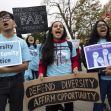The U.S. Supreme Court officially requested an opinion from President Biden's Administration regarding the race-conscious undergraduate admissions policies at Harvard University. The issue at hand is whether or not the Supreme Court should hear the challenges to the ivy league school's admissions programs that consider an applicant's race in the process.
The Court requested Biden's Solicitor General Elizabeth Prelogar to review the challenge, Students for Fair Admissions v. President and Fellows of Harvard College (Case No. 20-1199). It is expected this review will take about three to four months.
Currently, federal laws allow schools to consider an applicant's race, though this information must not be used as a factor in the final determination for admission to schools.
U.S. schools follow federal laws when issuing admissions programs and acceptances, scholarships, and other matters, including geographic school assignment maps.
Since 2014, the issue of Harvard's race-conscious admissions programs has become a battlefield, with education experts and courts disagreeing along the way.
In November 2020 the Students for Fair Admissions (SFFA) asked the U.S. Court of Appeals for the 1st Circuit in Boston to review Harvard's usage of race in its admissions policies, claiming it was created to ensure Black and Hispanic students' enrollment would not "plummet."
The SFFA alleged Harvard is "obsessed with race" and discriminates against Asian-American applicants by violating Title VI of the Civil Rights Act of 1964, which in part prohibits discrimination based on race in federally funded programs.
At the time, Harvard released a brief against the review of its admissions' policies, stating, "Consideration of race in this manner enables schools to pursue profound educational benefits while using race only in a limited way and only to the extent needed to assemble diverse classes that will produce such benefits."
Yet numerous briefs support the appeal, with former Trump-appointed head of the U.S. Department of Education for Civil Rights Kenneth L. Marcus in favor of the Supreme Court taking on this challenge.
In Marcus' brief, he said schools are still struggling "with issues of race," including in grades K - 12. The brief included examples of some K - 12 schools that planned to reopen ahead of other schools during COVID-19, based upon specific racial demographics.
The brief states this action based upon racial demographics is a violation of Title VI.
In 2020, the Trump administration supported the challengers of Harvard's admissions policies in the First Circuit in Boston. In a 2020 brief to the court, the Trump administration argued: "the wisdom of race-based admissions policies like Harvard's is subject to vigorous debate."
Before Trump supported an appeal in 2015, President Obama's administration took the opposite tack, supporting race as a consideration during undergraduate admissions policies, stating similar admissions policies at the University of Texas were acceptable.
"The university defined its educational objectives with clarity, explaining that it sought to improve opportunities for cross-racial interaction, particularly in the classroom, in order to fulfill its mission of training the next generation of Texas leaders," stated the Obama administration brief. "The university also identified an interest in admitting minority students who had distinguished themselves academically in ways not captured by class rank or who had demonstrated nonacademic achievements and leadership abilities."
In 2016, the Supreme Court ruled 4 - 3, agreeing to uphold the University of Texas race-conscious admissions policies. Justice Anthony M. Kennedy wrote, "considerable deference is owed to a university in defining those intangible characteristics, like student body diversity, that is central to its identity and educational mission."
Two years later, in 2018, the Justice Department said Harvard's racial-conscious admissions policies "may be infected with racial bias against Asian Americans."
The Biden administration, only a few weeks after the president took office, withdrew a similar challenge by the Trump administration against Yale University's race-conscious admissions programs.






